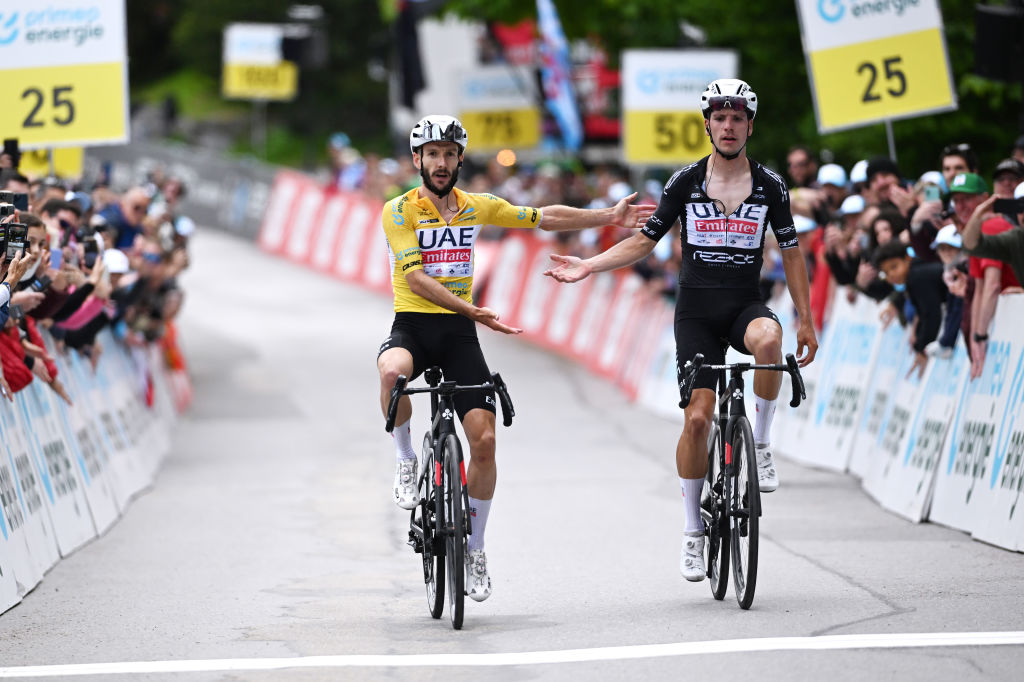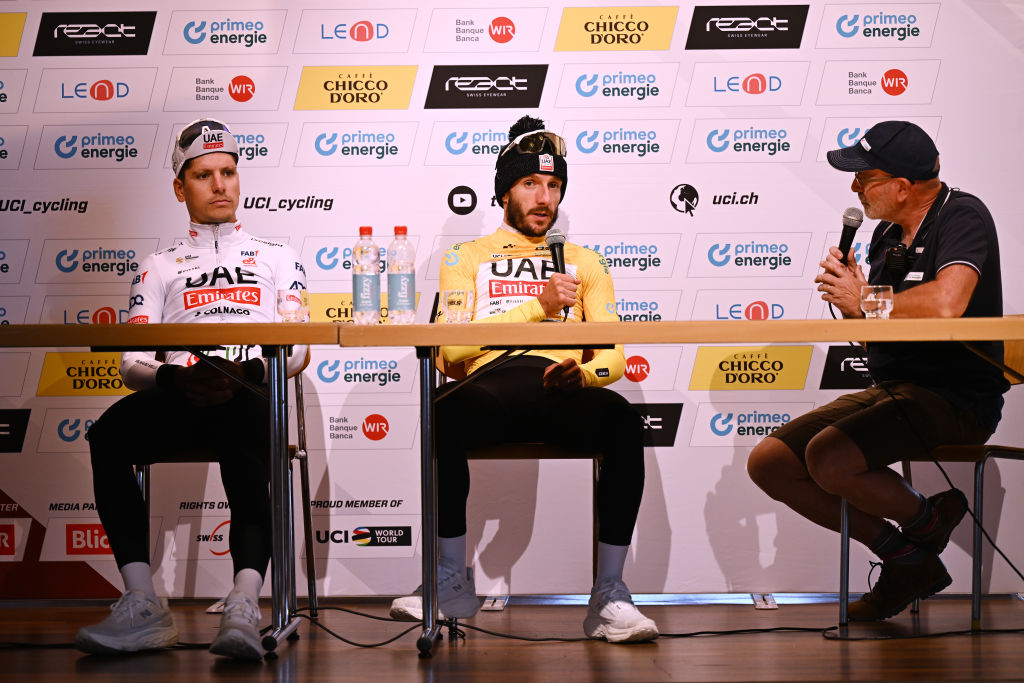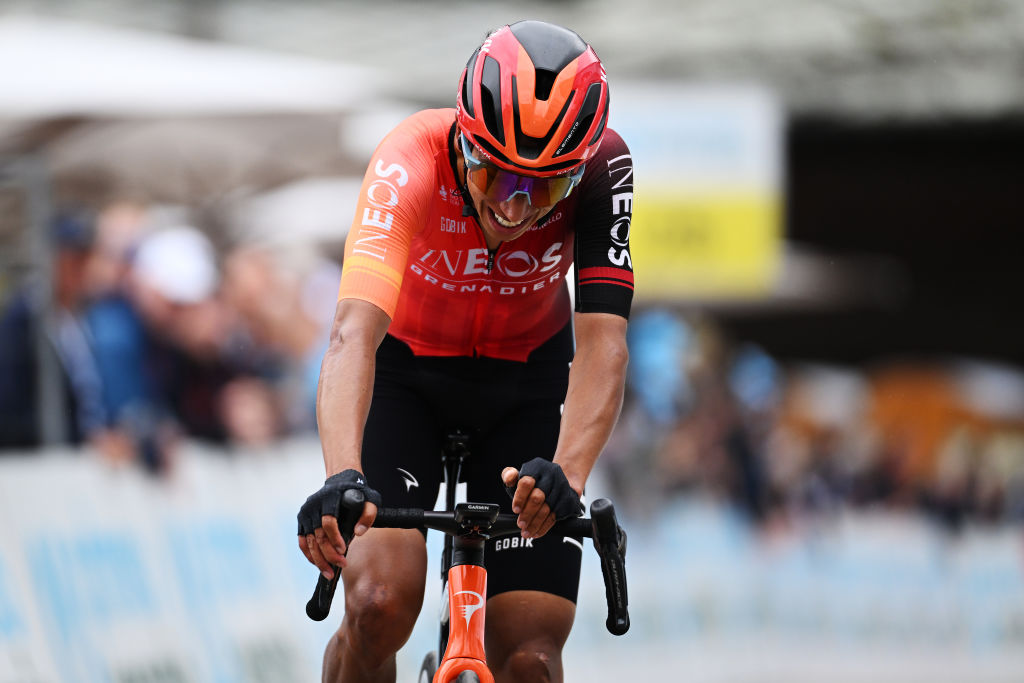UAE Team Emirates' stunning show at the Tour de Suisse sets the stage for a dominant Tour de France from Tadej Pogačar
Philippa York on how Adam Yates and João Almeida's dominance highlights strength of Slovenian's supporting cast

The Tour de Suisse is a big deal. In the hierarchy of stage racing, it sits alongside the Critérium du Dauphiné as one of the main indicators of who is likely to be closely involved in the shake-up at the Tour de France. With less than two weeks to this year’s start in Florence, a rider can’t afford to be in average form. They need to be very good and just about in top shape. They might be able to add a little sharpness, but if you’re lacking stamina here then you will be found wanting in July.
The Swiss race is often a challenge that suits those who can climb, but there are usually a couple of flatter days to give something to the sprinters who have dared to make the voyage. Not at this 87th edition, however. The best the proper fast men could enjoy was a short prologue, as the other seven stages had hills or mountains. Most of them, therefore, were present to reacquaint themselves with Alpine climbs while hopefully not suffering too much in the process.
Only Bryan Coquard succeeded in taking a stage win on the second day, and though he and Michael Matthews got in the break a few days later they couldn’t survive so much climbing. Notable, too, was Thibau Nys’ return to being one of the best when it’s a tough drag to the finish on stage 3, though the late attack by Mark Hirschi inside the last 3km almost worked out.
Other than that, every day from stage 4 onwards was a UAE Team Emirates demonstration. It’s quite rare to see such a display of collective strength where two riders from the same team swap victories over consecutive days, but that’s what happened, with Adam Yates taking stage 5 and seven, and João Almeida winning stages 6 and 8. If it wasn’t for Torstein Træen holding on from the early escape atop the Gotthard Pass, then it would have been another victory for Adam Yates.
It’s quite remarkable the progression that Adam has made since he moved from Ineos, where he was unable to establish himself amongst their plethora of talent. He did win Catalunya and the Deutschland Tour, but four victories in two seasons pales in significance compared to his achievements since joining UAE. I think it’s fair to say he had become the lesser of the Yates twins, with brother Simon outshining him but that’s been totally reversed since last year.

Adam’s climbing ability has stepped up a level and his concentration, too, as there’s no more loitering at the back of the peloton like he used to do when with Michelton-Scott. He’s developed into a bit of a weapon for the team, whether that’s as one of the main supports for Tadej Pogačar or, as we witnessed in Switzerland, as the man who finishes off the work done by his teammates when a mountaintop finish is on the cards.
Yates’ GC victory was largely due to his newfound motivation to attack his rivals rather than waiting for someone else to make the race.
Get The Leadout Newsletter
The latest race content, interviews, features, reviews and expert buying guides, direct to your inbox!
The return to form of João Almeida made things slightly complicated for UAE, but I think that was a good problem to have rather than a potential falling out. It’s been a while since the Portuguese rider was climbing and time trialling so well. He won a stage at last year’s Giro and had consistently taken the youth classification in a lot of stage races, but he seemed to be missing something when up against the biggest talents. He now looks to be closing that gap to the very top of the GC contenders. He might have been out-raced by Adam Yates on this occasion, but the aggression and battling characteristics that he first showed at Quickstep have reappeared.
The Tour de Suisse concluded with UAE taking the GC, the points, the king of the mountains, the team prize and the top two places on the podium, so I think it’s fair to say that Tadej Pogačar doesn’t have much to worry about concerning his support for the Tour de France. To win the Tour you need riders who you can rely on to be present when the final selections are made and last week UAE Team Emirates showed they are probably going to be the strongest collective in France.

Bernal and Pidcock
As for the rivals, there were a couple of performances to note. Egan Bernal is improving with every race and with his Tour de Suisse results, he becomes a valuable asset for Ineos again. I don’t think he can ask for equal status with Carlos Rodríguez at the Tour just yet, but he’s way better than the start of the season and he’ll have gained confidence from the way he was able to be present again at a high-level stage race.
Tom Pidcock, on the other hand, was slightly disappointing. Even though he finished the race 6th on GC, there was that last bit of form missing that would have enabled him to challenge for the overall title. His time trial ability is still there, but outside of that type of effort he looked to be at his limit. It’s all relative though and, in this context, his reputation isn’t in his favour. We expect brilliance from Pidcock all the time, but coming down from altitude maybe this is all part of the plan.
A quick glance at the white jersey competition shows Mattias Skjelmose confirming his march up the rankings, and though he’s not down to start the Tour he’s quickly becoming Lidl-Trek’s stage race leader. Less than 30 seconds behind him was a name to watch out for, riding for Israel-Premier Tech, Matthew Riccitello looks to be developing nicely into the type of climber who is heading towards great things. Sandwiched between Bernal and Pidcock on the final GC and with a third place on the penultimate day, he was quite surprised by his riding over the week but there’s been a steady progression in his results. Having completed the Giro last year, it’ll be interesting to see how he does at the Vuelta in a couple of months’ time.
The main thing to take from this Tour de Suisse, though, is that UAE and Tadej Pogačar will be the favourites for the Tour de France by quite a margin. Primož Roglič and Bora Hansgrohe will have noted the level they need to reach, and they may well attain that on certain days, but when it comes to the high mountains, UAE seem to have multiple options. If there was no bickering in Switzerland over the final result between Pogačar’s lieutenants, then whoever emerges as the challenger in July is in for a hard time.
Philippa York is a long-standing Cyclingnews contributor, providing expert racing analysis. As one of the early British racers to take the plunge and relocate to France with the famed ACBB club in the 1980's, she was the inspiration for a generation of racing cyclists – and cycling fans – from the UK.
The Glaswegian gained a contract with Peugeot in 1980, making her Tour de France debut in 1983 and taking a solo win in Bagnères-de-Luchon in the Pyrenees, the mountain range which would prove a happy hunting ground throughout her Tour career.
The following year's race would prove to be one of her finest seasons, becoming the first rider from the UK to win the polka dot jersey at the Tour, whilst also becoming Britain's highest-ever placed GC finisher with 4th spot.
She finished runner-up at the Vuelta a España in 1985 and 1986, to Pedro Delgado and Álvaro Pino respectively, and at the Giro d'Italia in 1987. Stage race victories include the Volta a Catalunya (1985), Tour of Britain (1989) and Critérium du Dauphiné Libéré (1990). York retired from professional cycling as reigning British champion following the collapse of Le Groupement in 1995.
